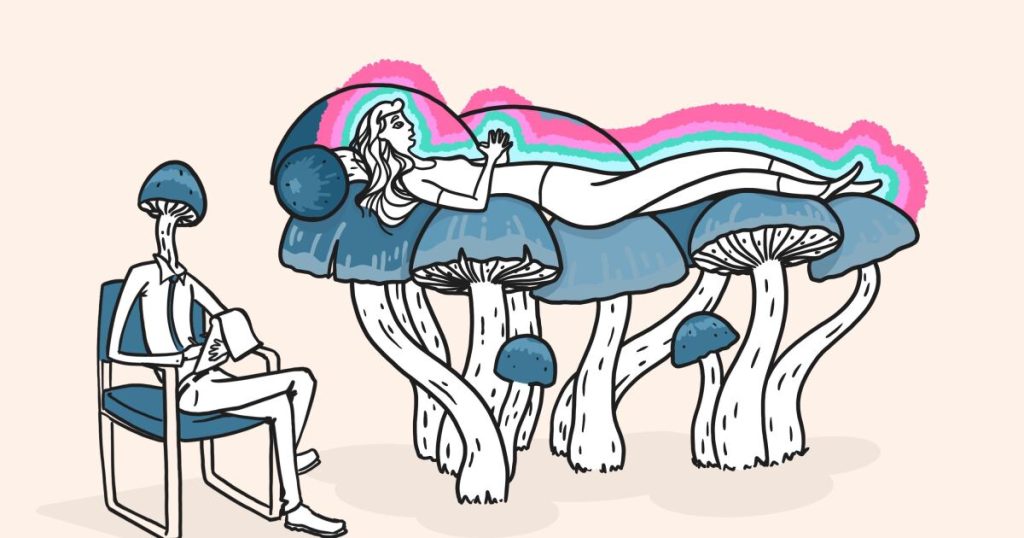What Psilocybin Assisted Therapy

Also known as psilocybin-assisted therapy, psilocybin therapy involves the use of a psychedelic compound that is native to a specific type of mushroom in a psychotherapeutic setting. Psilocybin mushrooms are colloquially known as “magic mushrooms” or “shrooms,” and have been used for thousands of years as a spiritual and medicinal tool among Indigenous
Psilocybin is a classic hallucinogen with combined serotonergic and glutamatergic action. This makes psilocybin an attractive candidate for therapeutic approaches to neurological disorders. Preliminary evidence of the anti-depressive effects of psilocybin-assisted therapy, as documented among patients with life-threatening cancer or treatment-resistant depression, indicates psilocybin-assisted therapy is a novel form of antidepressant intervention.populations
Who Can Psilocybin Therapy Help?
Psilocybin therapy is generally used for people with issues that may be refractory to conventional therapies.
Below are some of the populations who have been shown to benefit from psilocybin therapy.
Chronic Illness Patients
For people with life-threatening cancer, a single dose of psilocybin was shown to dramatically reduce their depression and anxiety.7 The effects were long-lasting, with 60% to 80% of the group continuing to experience improvement in those symptoms over six months later.
Another study of cancer patients performed showed that over 80% continued to feel better over six months after the single-dose therapy.8 They reported improvements in their attitudes about life, their moods, and their sense of spirituality, as well as a reduction in their depression, anxiety, and feelings of dread or hopelessness about their illness.
People With Depression and Anxiety
Both depression and anxiety can be serious, debilitating conditions that make people unable to go about their normal day-to-day lives.
For patients whose depression had previously been resistant to treatment, the results of studies have been no less profound. One study showed that 13 out of 20 patients experienced improvement, and for four of them, the depression went into remission.9
In regards to patients with anxiety, a meta-analysis of two dozen studies stated that overall, 65% of patients experienced less anxiety after psilocybin therapy treatment.10
It’s clear that psilocybin therapy has the potential to reduce the symptoms of depression and anxiety.
PTSD Patients
The symptoms of post-traumatic stress disorder can persist for years after a traumatic event, and it can disrupt all facets of life. Psilocybin has been studied for usage with PTSD patients with positive results.
Other Uses
Studies have been published that have explored the use of psilocybin therapy for drug addiction, smoking cessation, Alzheimer’s disease, and more.4
Benefits of Psilocybin Therapy
Based on the various studies included in this article, the benefits of psilocybin therapy include the following:
- Reduced rates of depression
- Chronic depression moving into remission
- Lowered levels of anxiety
- Improved mood
- Less fear of the future
- Increased sense of spirituality and connection
- Enhanced quality of life
- A Day in the Life With Depression
- Effectiveness
No form of therapy is a panacea, and there will always be some people who react differently to a specific treatment than others do.
Based on the studies reviewed in this article, it’s common for about two-thirds of people who try psilocybin therapy to note marked positive results that last.
This includes populations that have conditions that have resisted treatment in the past.
Because studies have only been funded for the last two decades, and have only been funded by the U.S. government for the last two to three years, there is still much more research needed.
Things to Consider
Because psilocybin is a psychoactive substance, it’s important to be fully informed before you contemplate using it. It should always be done in the company of a licensed therapist who is specialized in its therapeutic usage.
There May Be Potential for Addiction
Even though psilocybin is generally not considered an addictive drug, people who have substance abuse problems still could potentially find themselves drawn to take the substance again, outside of their clinical setting.
This is a tricky subject because the drug has been researched in the treatment of certain substance use issues, so it’s wise to discuss this at length with your practitioner.
It Might Bring Up Uncomfortable Emotions
Even if you have positive results from the therapy it may not be a completely enjoyable experience. That’s why it’s so important that it be facilitated by someone who can help you if things go awry.
It’s important to realize that in order to move through painful parts of your life, you’ll likely be confronting them head-on in the session. That can be scary and uncomfortable in the best of times, let alone when under the influence of psychedelics.
Patients With Heart Problems Should Exercise Caution
There have been some questions whether psilocybin might cause certain types of cardiac issues, however there is no clear evidence for this. If you have any cardiac or medical issues, check with your physician before considering its use.
